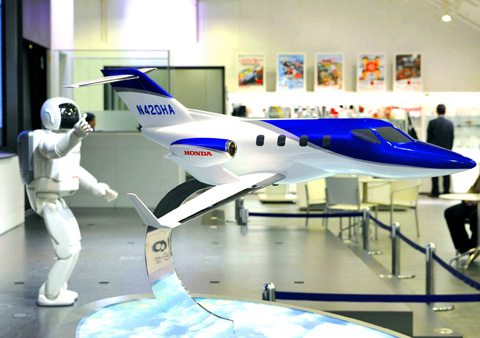Japan’s Honda Motor Co warned yesterday it expected net profit to tumble 18.3 percent in the current fiscal year owing to a stronger yen, a US economic slowdown and higher raw material costs.
The gloomy outlook came as Japan’s second-largest automaker said net profits edged up 1.3 percent in the financial year just ended to a record high — the first rise in the group’s annual earnings in two years.
Japanese automakers have enjoyed brisk profits in the US market, helped by firm demand for fuel-efficient cars and a weak yen. But a US credit crunch and a falling dollar are now weighing on their earnings prospects.

PHOTO: AFP
Honda forecast annual net earnings of ¥490 billion (US$4.7 billion) for the year to next March, down from ¥600.04 billion in the financial year which ended last month.
Operating profit is expected to slide 31.8 percent to ¥650 billion, with revenue seen edging up 1.1 percent to ¥12.14 trillion.
Honda said business conditions “remain uncertain because of global political and economic uncertainties, fluctuations in oil and raw material prices, and movements in currency, finance and capital markets.”
“As a result, Honda expects the operating environment to remain difficult,” it said.
For the fiscal year just ended, Honda posted an 11.9 percent increase in operating profit to ¥953.11 billion as revenue rose 8.3 percent to ¥12 trillion.
However, in the fourth quarter to March alone, the automaker’s net earnings plunged 85.6 percent from a year earlier to ¥25.4 billion, hit by higher taxes and raw material costs and a 1 percent drop in revenue to ¥3.06 trillion.
A decision by the Tokyo Regional Taxation Bureau to demand additional taxes cut profit for the last quarter, the automaker said.
The tax bureau said Honda had not been taxed adequately for its Chinese joint ventures over a five-year span that ended in March 2006.
Honda said it believed it had been abiding by law and paid appropriate taxes in China, but no agreement could be reached with the tax authorities.

Taiwan is projected to lose a working-age population of about 6.67 million people in two waves of retirement in the coming years, as the nation confronts accelerating demographic decline and a shortage of younger workers to take their place, the Ministry of the Interior said. Taiwan experienced its largest baby boom between 1958 and 1966, when the population grew by 3.78 million, followed by a second surge of 2.89 million between 1976 and 1982, ministry data showed. In 2023, the first of those baby boom generations — those born in the late 1950s and early 1960s — began to enter retirement, triggering

ECONOMIC BOOST: Should the more than 23 million people eligible for the NT$10,000 handouts spend them the same way as in 2023, GDP could rise 0.5 percent, an official said Universal cash handouts of NT$10,000 (US$330) are to be disbursed late next month at the earliest — including to permanent residents and foreign residents married to Taiwanese — pending legislative approval, the Ministry of Finance said yesterday. The Executive Yuan yesterday approved the Special Act for Strengthening Economic, Social and National Security Resilience in Response to International Circumstances (因應國際情勢強化經濟社會及民生國安韌性特別條例). The NT$550 billion special budget includes NT$236 billion for the cash handouts, plus an additional NT$20 billion set aside as reserve funds, expected to be used to support industries. Handouts might begin one month after the bill is promulgated and would be completed within

The National Development Council (NDC) yesterday unveiled details of new regulations that ease restrictions on foreigners working or living in Taiwan, as part of a bid to attract skilled workers from abroad. The regulations, which could go into effect in the first quarter of next year, stem from amendments to the Act for the Recruitment and Employment of Foreign Professionals (外國專業人才延攬及僱用法) passed by lawmakers on Aug. 29. Students categorized as “overseas compatriots” would be allowed to stay and work in Taiwan in the two years after their graduation without obtaining additional permits, doing away with the evaluation process that is currently required,

IMPORTANT BACKER: China seeks to expel US influence from the Indo-Pacific region and supplant Washington as the global leader, MAC Minister Chiu Chui-cheng said China is preparing for war to seize Taiwan, Mainland Affairs Council (MAC) Minister Chiu Chui-cheng (邱垂正) said in Washington on Friday, warning that Taiwan’s fall would trigger a regional “domino effect” endangering US security. In a speech titled “Maintaining the Peaceful and Stable Status Quo Across the Taiwan Strait is in Line with the Shared Interests of Taiwan and the United States,” Chiu said Taiwan’s strategic importance is “closely tied” to US interests. Geopolitically, Taiwan sits in a “core position” in the first island chain — an arc stretching from Japan, through Taiwan and the Philippines, to Borneo, which is shared by